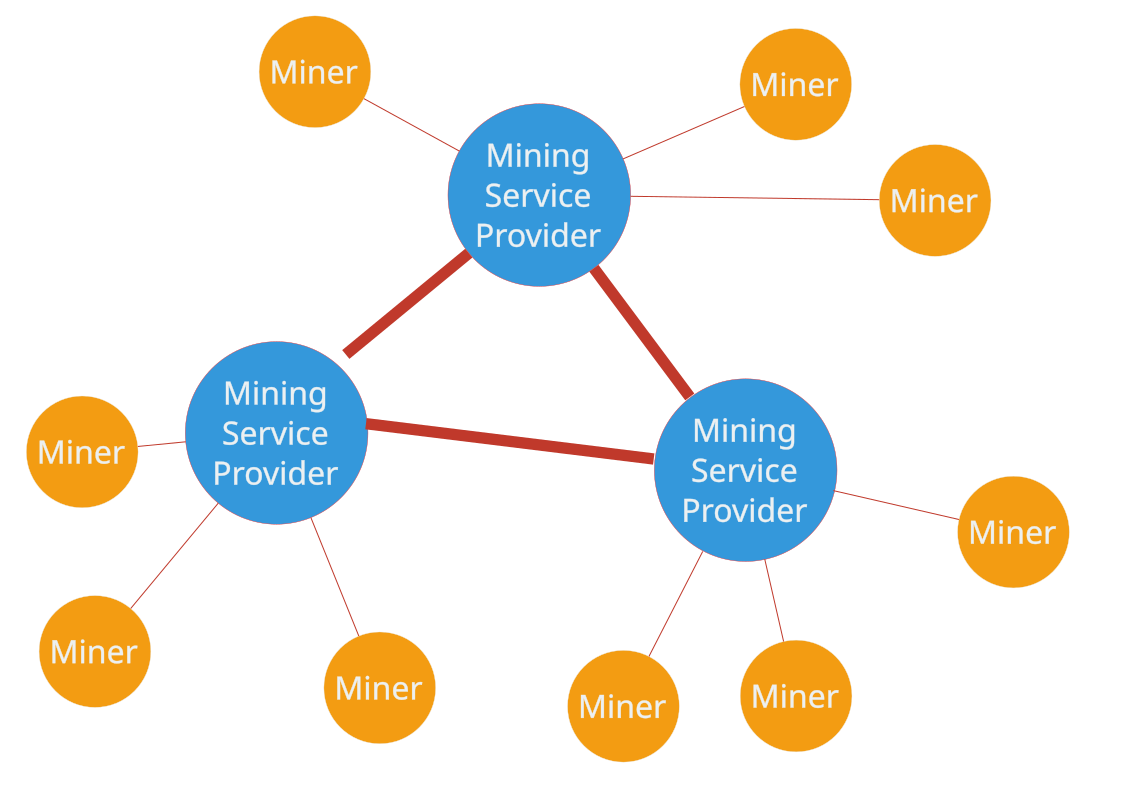Radpool - A Mining Syndicate

In Radpool, we replace a single centralised mining operator with a syndicate of operators called Miner Service Providers of MSPs. The syndicate resists mining centralisation by breaking up the centralised pool. The members of the syndicate build blocktemplates, enable miner payouts, and help reduce variance for miners by working together as a pool.
There are two types of parties in the system.
- Miners
-
these run mining facilities and do not need to run bitcoin node or a radpool node.
- Mining Service Providers
-
these run bitcoin nodes, generate block templates and collaborate to publish signatures that pay miners and the MSPs
Mining Service Providers
Miners register with an MSP and communicate with the syndicate using the stratum mining protocol. MSP take on the complexity in this design, allowing miners to switch from centralised pools without running any services. Here’s a list of responsibilities the MSPs take on:
-
Build block templates.
-
Run services to let miners register with them.
-
Run stratum servers that communicate work to miners.
-
Replicate block templates generated by all MSPs across the syndicate.
-
Replicate PoW shares generated by all miners across the syndicate.
Miners
The miner’s on the other hand simply need a service to manage their payouts. This can be a simple mobile application or an online dashboard. The important point here is that miners do not receive the network traffic of the entire pool and therefore do no need high throughput network connections. The are not real-time message delivery guarantees required from this service.
Coinbase and Miner Payouts
In radpool, the coinbase for block rewards requires a constant amount of disk space, so radpool’s network size and thus the hashrate is not limited by the coinbase size. The payout transaction is constructed such that neither the miner nor any syndicate member can steal coins or prevent the mining syndicate from making progress.
Payout Variance For Miners
Miners are paid out using a futures contract between the miner and its MSP. The miner is paid whenever the DLC contract expires and since this is independent of the pool’s luck, the miner is always paid out at the agreed upon expiry.
Any variance in payout is experienced by the MSPs who take on the risk of pool’s luck, and they charge miners a fees for this service of absorbing the variance in the payouts. The Payout Mechanism section describes this in detail.
Futures Contracts using DLCs
DLCs, Discrete Log Contracts, enable futures contracts between two parties with a third party acting as an oracle to settle the contract on expiry. In our case, the two parties are MSP and the miner. The Radpool syndicate is the Oracle for the DLC contracts between all miners and MSPs.
All miners are paid by MSPs using DLC contracts. The miners and MSPs generate contracts where MSPs pay miners an agreed upon amount of BTC on contract expiry, if and only if Radpool can confirm that the miner generated the given amount of hashrate over the contract period.
The Radpool payout mechanism has the following features:
-
MSPs pay miners with futures contract built using DLCs.
-
Radpool acts as an Oracle where a threshold number of MSPs generate the signature.
-
MSPs earn a yield in exchange of locking liquidity that fund payouts for miners.
-
The payout mechanism allows unilateral exits for miners and MSPs, thus making the solution non-custodial.
The Payout Mechanism section describes this in detail.